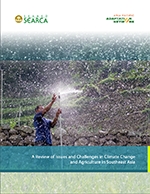A Review of Issues and Challenges in Climate Change and Agriculture in Southeast Asia
Climate change, with its impact on agriculture, is emerging as one of the most significant development issues in the region. Climate change, among others, could alter temperature and precipitation regimes over major agricultural production regions; the frequency and intensity of extreme events – typhoon, floods, and droughts; average sea level; and incidence of pests and diseases. Moreover, agriculture is vulnerable to the impacts arising from global efforts to mitigate greenhouse gases (GHGs) which are likely to affect production costs and income opportunities. Furthermore, climate change, combined with the increasing demand for food, feeds, fiber, and fuel, has the potential to irreversibly damage the natural resource base on which agriculture depends, with significant consequences for food insecurity (IAASTD 2009). Thus, the relationship between climate change and agriculture is two-way: agriculture significantly contributes to climate change and climate change, in general, adversely affects agriculture.
Thus, it is becoming extremely important to put forward discourses on climate change and agriculture in Southeast Asia within the framework of the sector’s role in meeting the objectives of developing countries for food security and sustainable development. This report is among the series of publications that APAN and SEARCA committed as a part of knowledge stocktaking on climate change in Asia and the Pacific. This report aims to identify the current issues and challenges in the agriculture sector at the national and sub-regional levels by providing information on the anticipated impacts of climate change on agriculture and food security in the region and on the ecosystems and communities most affected or most vulnerable. The current issues and challenges that hinder the strengthening of the ability to cope with climate change and its impacts are identified at the sub-regional and national levels.
APAN was launched in October 2009 as part of the Global Adaptation Network (GAN) to support adaptation capacity building, policy-setting, planning and practices through the mobilization and sharing of knowledge and technologies with the ultimate aim of building climate resilience of vulnerable human systems, ecosystems, and economies. APAN began its implementation from March 2009. One of the key activities of APAN is information generation, management and sharing to increase the knowledge base and promote dialogue on climate change adaptation among stakeholders. This helps link existing and emerging networks and initiatives in the region. It also aims to facilitate and scale up the application of existing and new knowledge on climate change adaptation.
SEARCA’s Climate Change Adaptation and Mitigation Program (CChAMP) aims to contribute to an enabled environment for rural poverty reduction and food security via built capacities and institutions that ensure climate change resiliency in agricultural production and sustainable natural resource management in Southeast Asia. Its main platform for knowledge sharing is the Knowledge Center on Climate Change Adaptation in Agriculture and Natural Resource Management in Southeast Asia (KC3).














